CORPORATE ACTION: Coca-Cola
Coca-Cola Great Britain Joins Forces With Merlin Entertainments To Promote Plastic Bottle Recycling
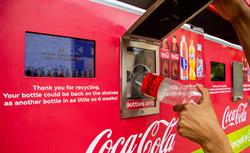 Coca-Cola Great Britain has partnered with Coca-Cola Europacific Partners and Merlin Entertainments to promote recycling of empty plastic bottles in the country. The promotion offers consumers the chance to win VIP experiences to family attractions operated by Merlin Entertainments. The collaboration is aimed at encouraging consumers to recycle plastic bottles through reverse vending machines located at different sites, including Alton Towers Resort, LEGOLAND Windsor Resort and Chessington World of Adventures Resort.[Image Credit: © Coca-Cola Europacific Partners]
Coca-Cola Great Britain has partnered with Coca-Cola Europacific Partners and Merlin Entertainments to promote recycling of empty plastic bottles in the country. The promotion offers consumers the chance to win VIP experiences to family attractions operated by Merlin Entertainments. The collaboration is aimed at encouraging consumers to recycle plastic bottles through reverse vending machines located at different sites, including Alton Towers Resort, LEGOLAND Windsor Resort and Chessington World of Adventures Resort.[Image Credit: © Coca-Cola Europacific Partners]
CORPORATE ACTION: Procter & Gamble
P&G Executive Highlights Company’s Use of Life-Cycle Assessment
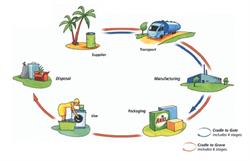 Victoria Jung, Packaging Technology Leader for P&G’s Surface Care Portfolio, discusses the company’s use of carbon-based life-cycle assessments to make its home care products and packaging more sustainable. Jung said the company uses LCA to assess products’ environmental impacts. The company’s “science-based packaging targets” for 2030 include using 100% recycled or reusable packaging and reducing use of virgin petroleum plastic in packaging by 50%.[Image Credit: © Procter & Gamble]
Victoria Jung, Packaging Technology Leader for P&G’s Surface Care Portfolio, discusses the company’s use of carbon-based life-cycle assessments to make its home care products and packaging more sustainable. Jung said the company uses LCA to assess products’ environmental impacts. The company’s “science-based packaging targets” for 2030 include using 100% recycled or reusable packaging and reducing use of virgin petroleum plastic in packaging by 50%.[Image Credit: © Procter & Gamble]
Procter & Gamble Offers Air Capsule As Sustainable Packaging For Ecommerce
.png&width=250&height=253)
Procter & Gamble developed the Air Capsule eCommerce package for the ecommerce channel. The company launched the Air Capsule at the 2021 China International Import Expo and filed for more than 12 patents worldwide. The packaging offers several advantages over traditional packaging, including less material, enhanced reliability and greater convenience. Air Capsule is also more space-efficient: it “requires only 25% of the trucking required to transport the same amount of products vs. those packed in corrugated boxes. It also requires 75% less warehousing space”.[Image Credit: © Procter & Gamble]
P&G Launches Campaign Promoting Recycling In China
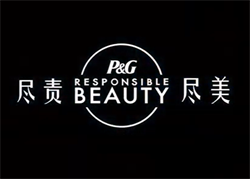
Procter & Gamble has launched a public awareness campaign aimed at promoting recycling and sustainability in China. The campaign is called “Responsible Beauty” and includes a film created and produced by Sweetshop China. The movie highlights a dancer and models wearing accessories made from recycled plastic bottles.[Image Credit: © Sweetshop/P&G]
P&G Works For Fully Sustainable, Convenient Packaging By 2023
 Procter & Gamble is developing sustainable packaging that is also functional and convenient. P&G Director of Sustainable Development for Linen Care division Guillaume Lebert said his company aims to change consumers’ habits through innovation. The company also works to ensure that its sustainability efforts, such as its investments in waste collection and recycling infrastructure, recyclability of packaging and the increase in use of recycled plastic, are adequately communicated to consumers.[Image Credit: © Procter & Gamble]
Procter & Gamble is developing sustainable packaging that is also functional and convenient. P&G Director of Sustainable Development for Linen Care division Guillaume Lebert said his company aims to change consumers’ habits through innovation. The company also works to ensure that its sustainability efforts, such as its investments in waste collection and recycling infrastructure, recyclability of packaging and the increase in use of recycled plastic, are adequately communicated to consumers.[Image Credit: © Procter & Gamble]
CORPORATE ACTION: Reckitt Benckiser
Reckitt’s Vanish Multipower Tabs Packaging Cuts Waste, Aims At Online Market
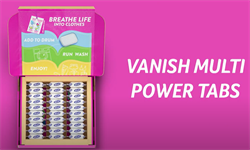
Reckitt has introduced the Multipower Tabs packaging for its Vanish brand of laundry care products in the UK. The tabs are made from “compressed powder” of the stain-removing product. The company worked with creative agency Marks in designing the “minimal packaging” aimed at the online market. Video ad here.[Image Credit: © RB]
CORPORATE ACTION: Tesco
Tesco Stops Selling Multipack Drinks To Reduce Plastic Packaging
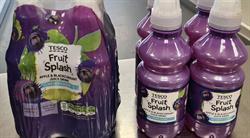 U.K. retailer Tesco is working to reduce unnecessary plastic packaging by no longer selling multipacks of its own-label drinks. The company expects to remove 12 million pieces of plastic each year, while offering single cans at prices equivalent to those sold in multipacks. Tesco plans to remove 33 million additional pieces of plastic in the autumn by stopping plastic multipacks for children’s lunchbox drinks, energy drinks, water and fruit juices.[Image Credit: © Tescoplc.com]
U.K. retailer Tesco is working to reduce unnecessary plastic packaging by no longer selling multipacks of its own-label drinks. The company expects to remove 12 million pieces of plastic each year, while offering single cans at prices equivalent to those sold in multipacks. Tesco plans to remove 33 million additional pieces of plastic in the autumn by stopping plastic multipacks for children’s lunchbox drinks, energy drinks, water and fruit juices.[Image Credit: © Tescoplc.com]
CORPORATE ACTION: Unilever
New Unilever ASEAN Chief Executive De Haan Pushes Company’s Sustainability Efforts

Unilever Group of Thailand and ASEAN has announced the appointment of Annemarique De Haan as the company’s new chief executive following the retirement of Robert Candelino. De Haan has gained significant experience in leading the company’s sustainability efforts. She has collaborated with Tops Market and SCGC in launching a product refill system.[Image Credit: © Annemarieke de Haan via Linkedin.com]
CORPORATE ACTION: Other
LFC Foundation Working With SC Johnson On Public Awareness Of Plastic Pollution
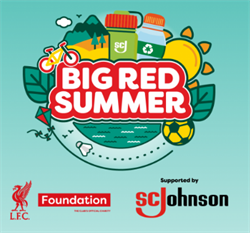
The LFC Foundation is working with SC Johnson to launch its 2022 Big Red Summer physical fitness campaign for families in Liverpool, England. The summer camp will run from July 18 to September 1, 2022, and will feature activities designed to help people of all age groups to improve their physical and mental wellbeing. The 2022 edition will also promote sustainability and public awareness of the problem of plastic pollution.[Image Credit: © LFC Foundation]
Sainsbury’s Launches Private-Label Toilet Rolls With Recyclable Plastic Packaging
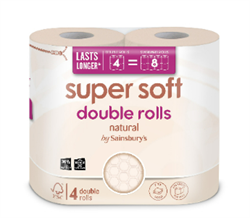
U.K. retailer Sainsbury’s has launched private-label double-length toilet rolls that come in 30 percent less plastic packaging. The product comes in recyclable plastic packaging and is available under the retailer’s Super Soft and House 247 lines of toilet rolls. They are designed to last longer and are cheaper than other toilet rolls.[Image Credit: © Sainsbury’s plc]
CAMPAIGNS, COMMITMENTS & NGOs
The Big Plastic Count Reveals Scope Of Plastic Waste Problem In UK
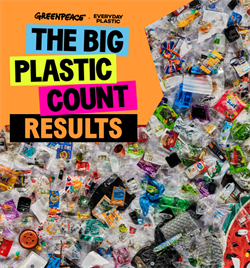
The average household in the U.K. throws away 66 pieces of plastic in a week, according to “The Big Plastic Count” survey. Survey organizers, Greenpeace and Everyday Plastic, used the survey results to estimate that the UK throws out almost 100 billion pieces of plastic each year. Results of the survey also revealed that 83 percent of the plastic thrown away came from food and drink packaging waste.[Image Credit: © Greenpeace]
Canada Plastics Pact Unveils 2020 Baseline Data On Plastic Packaging Waste
 Canada produced an estimated 1.89 million tonnes of plastic packaging in 2019, with only 12 percent of the total recycled, according to the Canada Plastics Pact. Details from the “2020 Baseline Report” also revealed the top 3 types of plastic packaging were PET bottles, HDPE bottles and mono-material PE flexibles in a business-to-consumer context. CPP was launched in 2021 and currently has some 90 partners supporting the organization’s efforts to eliminate plastic packaging waste and develop a circular economy for packaging in the country.[Image Credit: © Canada Plastics Pact]
Canada produced an estimated 1.89 million tonnes of plastic packaging in 2019, with only 12 percent of the total recycled, according to the Canada Plastics Pact. Details from the “2020 Baseline Report” also revealed the top 3 types of plastic packaging were PET bottles, HDPE bottles and mono-material PE flexibles in a business-to-consumer context. CPP was launched in 2021 and currently has some 90 partners supporting the organization’s efforts to eliminate plastic packaging waste and develop a circular economy for packaging in the country.[Image Credit: © Canada Plastics Pact]
CONSUMER & PUBLIC OPINION
Study Highlights Factors Driving UK Consumers To Choose Reusable Packaging
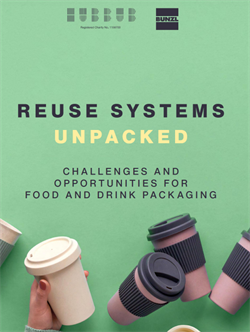
In the UK, 3 out of 4 respondents believe it should be made easier to choose reusable alternatives to single-use food and drink packaging. Details from the report, “Reuse Systems Unpacked” by Hubbub and Buzl, revealed the leading factors that encourage respondents to choose reusable packaging: 41 percent said “no extra cost”, ahead of “earning rewards or discounts” and being environment-friendly, both at 38 percent. The leading factors that keep consumers from using reusable packaging include concerns about hygiene and catching COVID.[Image Credit: © Hubbub and Buzl]
MARKET NEWS
Circular Economy Promises €500 Billion In Annual Revenue For European Consumer Goods Companies
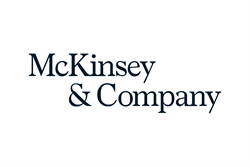 McKinsey claims that Europe’s consumer goods companies can move to a circular economy worth more than €500 billion in annual revenue through “portfolio transformation, green business building, green premiums, and green operations focused on circularity”. Such a transformation will be driven mainly by a shift in consumer demand, with younger consumers leading the way with values-driven purchases. Research has revealed that around 40 percent of European consumers consider sustainability as “highly important”, while a 2021 survey showed that about 50 percent of consumers in Germany, France, and the UK have bought preowned items.[Image Credit: © McKinsey]
McKinsey claims that Europe’s consumer goods companies can move to a circular economy worth more than €500 billion in annual revenue through “portfolio transformation, green business building, green premiums, and green operations focused on circularity”. Such a transformation will be driven mainly by a shift in consumer demand, with younger consumers leading the way with values-driven purchases. Research has revealed that around 40 percent of European consumers consider sustainability as “highly important”, while a 2021 survey showed that about 50 percent of consumers in Germany, France, and the UK have bought preowned items.[Image Credit: © McKinsey]
POLICY, REGULATION & LEGAL
Ireland’s New Law Promotes Circular Economy, Recycling And Sustainability
 Ireland has signed into law the Circular Economy and Miscellaneous Provisions Act 2022, which aims to promote a circular economy. The law moves the country away from a “take-make-waste” economy and encourages the use of recycled and reusable alternatives to single-use packaging. Other provisions of the law include transforming the current Environment Fund into a Circular Economy Fund and introducing a mandatory segregation and incentives-based charging system for commercial waste. The law also authorizes local authorities to use GDPR-compliant technologies to expose and prevent illegal dumping and littering.[Image Credit: © Creative Commons]
Ireland has signed into law the Circular Economy and Miscellaneous Provisions Act 2022, which aims to promote a circular economy. The law moves the country away from a “take-make-waste” economy and encourages the use of recycled and reusable alternatives to single-use packaging. Other provisions of the law include transforming the current Environment Fund into a Circular Economy Fund and introducing a mandatory segregation and incentives-based charging system for commercial waste. The law also authorizes local authorities to use GDPR-compliant technologies to expose and prevent illegal dumping and littering.[Image Credit: © Creative Commons]
California’s New Law Aims To Cut Pollution Caused By Single-Use Plastic Packaging
 California Governor Gavin Newsom has signed a new law creating a producer responsibility organization to manage a collection and recycling program for printed paper and packaging in the state. The law was approved by the state legislature following a compromise deal between industry groups and environmentalists. The Plastic Pollution Producer Responsibility Act requires a 25 percent reduction in single-use plastic packaging and foodservice items by 2032. Almost half of the reduction must come from eliminating plastic packaging or from reuse and refill, rather than switching to other single-use packaging materials. The law also mandates that all single-use packaging be recyclable or compostable by 2032.[Image Credit: © State of California]
California Governor Gavin Newsom has signed a new law creating a producer responsibility organization to manage a collection and recycling program for printed paper and packaging in the state. The law was approved by the state legislature following a compromise deal between industry groups and environmentalists. The Plastic Pollution Producer Responsibility Act requires a 25 percent reduction in single-use plastic packaging and foodservice items by 2032. Almost half of the reduction must come from eliminating plastic packaging or from reuse and refill, rather than switching to other single-use packaging materials. The law also mandates that all single-use packaging be recyclable or compostable by 2032.[Image Credit: © State of California]
Industry Groups And Environmentalists Claim UK’s Plastics Tax Not Working
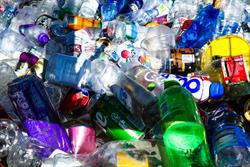 Critics are claiming that the plastics tax designed as a government policy against plastic pollution in the U.K. is failing. The policy mandates taxing companies for using any packaging with less than 30 percent recycled plastic. Increases in prices of food-grade recycled plastic and scarcity of recycled plastics have made the law’s implementation difficult while recycling proponents claim the law does not go far enough to encourage recycling.[Image Credit: © Nick Fewings]
Critics are claiming that the plastics tax designed as a government policy against plastic pollution in the U.K. is failing. The policy mandates taxing companies for using any packaging with less than 30 percent recycled plastic. Increases in prices of food-grade recycled plastic and scarcity of recycled plastics have made the law’s implementation difficult while recycling proponents claim the law does not go far enough to encourage recycling.[Image Credit: © Nick Fewings]
India Implements Ban On Single-Use Plastics In July 2022

The ban on single-use plastics, announced by India’s Ministry for Environment, Forest and Climate Change in August 2021, took effect on July 1, 2022. The Central Pollution Control Board also issued guidelines asking the country’s states to ban the use of single-use plastics. The list of banned plastics includes balloon sticks, cigarette packs, candy and ice cream sticks, and PVC banners. Under the country’s Environment Protection Act 1986, violators of the ban may be penalized with up to five years in prison, or fined up to Rs 1 lakh, or both.[Image Credit: © Government of India]
INNOVATION & TECHNOLOGY
NextLooPP Completes Trial Manufacturing Run Of Food-Grade Recycled PP Packaging
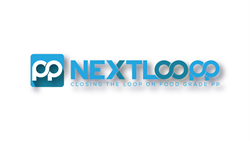 NextLooPP partnered with thermoformed food packaging manufacturer Mannok Pack to complete full-scale packaging production trials for food-grade recycled polypropylene (PP) resins. Mannok Pack ran trial production at the company’s manufacturing facility in County Cavan, Ireland. The companies said that the 30 percent recycled packs displayed “excellent visual and processing characteristics” and minor but acceptable product variations versus virgin PP packs.[Image Credit: © NextLooPP ]
NextLooPP partnered with thermoformed food packaging manufacturer Mannok Pack to complete full-scale packaging production trials for food-grade recycled polypropylene (PP) resins. Mannok Pack ran trial production at the company’s manufacturing facility in County Cavan, Ireland. The companies said that the 30 percent recycled packs displayed “excellent visual and processing characteristics” and minor but acceptable product variations versus virgin PP packs.[Image Credit: © NextLooPP ]
RESEARCH
Netherlands Scientists Detect Microplastics In Farm Animals And Feeds
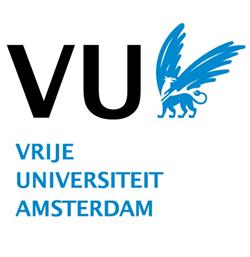
Scientists at the Vrije Universiteit Amsterdam in the Netherlands detected microplastics in beef and pork and in the blood of cows and pigs. The pilot study also found microplastics in all samples of animal pellet feed that were tested. The scientists used the same methods used in a previous study that detected microplastics in human blood, reported in March 2022.[Image Credit: © Vrije Universiteit Amsterdam]
The Body Shop Report Shows Razors Top List Of US Cosmetic Plastic Waste
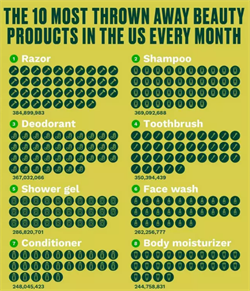
American households throw away 385 million units of razors, 369 million units of shampoo and 367 million units of deodorant plastic packaging every month. Results of the report, “Body Plastic Pile Up”, by The Body Shop revealed New York City leads the country in plastic recycling with 65.5 percent of respondents claiming they regularly recycle. Indianapolis is in last place with 27.5 percent of respondents saying they recycle. 54 percent of consumers said they are more likely to buy from brands using sustainable packaging; 50 percent said they are working to cut their cosmetic plastic consumption.[Image Credit: © The Body Shop ]
Copyright 2026 Business360, Inc.

